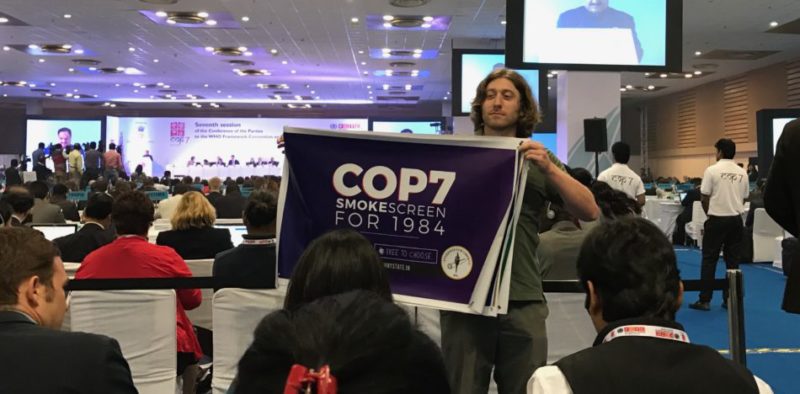Nigeria’s propositions at the ongoing Seventh Session of the Conference of the Parties (COP7) to the World Health Organisation (WHO) Framework Convention on Tobacco Control (FCTC) in India appear not to have gone down well with certain circles, especially campaigners, who see this development as an obstacle to progress on protecting tobacco control policymaking from the tobacco industry.

Representatives of non-governmental organisations (NGOs) have criticised the Nigerian delegation attending the WHO COP7 for promoting tobacco industry interests through what they term “misleading interpretation of the treaty guidelines”.
Some members of the Nigerian delegation reportedly advanced arguments criticising the treaty’s Article 5.3 guidelines limiting Parties’ interaction with the tobacco industry, as well as Articles 9 and 10, which recommend measures to reduce the addictiveness of tobacco products.
In a public statement at the COP, a Nigerian delegate on the Tobacco Control Desk of Standards Organisation of Nigeria (SON) is said to have attempted to sow doubt about the addictiveness of tobacco products – a familiar tobacco industry tactic – despite decades-long consensus on the issue. The delegate allegedly recommended watering down protections against industry interference in tobacco control policymaking. The Nigerian Ministry of Health is said to be underrepresented in this year’s Nigerian delegation, a development, according to Philip Jakpor, Nigeria Spokesperson, Network for Accountability of Tobacco Transnationals (NATT), is heightening suspicions of broader industry interference.
“It is very disturbing and shocking to civil society and other governments that members of the Nigerian delegation advanced invalid arguments promoted by the tobacco industry, which has a sole aim: raking in profits at the expense of people’s health,” said Jakpor in a statement.
For decades, the tobacco industry has lobbied extensively against tobacco control policies at the national and international levels. In November 2015, a whistleblower reportedly revealed British American Tobacco’s bribery of a Burundi delegate in an attempt to water down, weaken, and block progress on tobacco control at the FCTC. Given Big Tobacco’s well-documented history of influencing FCTC delegates to promote its agenda, participants at these negotiations raised questions about whether Nigeria’s comments were influenced by the industry.
Hellen Neima, a tobacco control advocate from Uganda attending the Conference of the Parties, said: “The Nigerian position was the lowest moment of the discussion yesterday. It came in stark contrast to the applause received by other African governments who stood in firm support for protection against tobacco industry intimidation and bullying.”
Members of civil society warned that Nigeria’s comments may threaten advances to public health, including guidelines around the toxicity of tobacco products. Article 9 proposes guidelines for testing and measuring of the contents and emissions of tobacco products, and regulation of the contents and emissions, while Article 10 requires manufacturers and importers of tobacco products to disclose to governmental authorities information about the contents and emissions of tobacco products. They also urged countries to stay united in their prioritisation of public health over the industry’s interests.
“The global tobacco treaty makes it explicitly clear that tobacco industry interference poses the single greatest threat to tobacco control. The confusing proposition by Nigeria has the potential of rolling back the united position of the African bloc on the underlying issues,” said John Stewart, deputy campaigns director with Corporate Accountability International.
Despite the Nigerian delegation’s objections, a majority of Parties to the global tobacco treaty support a suite of public health provisions, including ones that protect public health policymaking from the tobacco industry’s influence. According to a WHO report released this week, Parties to the treaty recognise the industry as the biggest threat to progress.
The global tobacco treaty negotiations are taking place in Greater Noida, India, from November 7-12. The Framework Convention on Tobacco Control is estimated to save more than 200 million lives when fully implemented.
